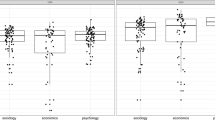Abstract
It has already been pointed out that the foreign language barrier is probably the greatest impediment to the free flow and transfer of information. This barrier is even growing as scientists of more and more countries publish in their own languages. Almost all studies addressing the language barrier problem were conducted from an Anglo-Saxon perspective, limiting their scope to English-language sources or English speakers. Little research has been devoted to studying and measuring language preference among non-English-speaking scholars.
This article reviews measures proposed in former studies such as the “relative own-language preference” indicator, and the “straight odds ratio”, pointing out their advantages and drawbacks. Two new refined measures (in both “raw” and normalised versions) are offered, claiming to be free of these drawbacks, and thus enabling a better and more reliable comparison between journals of different languages. Practical use of the proposed measures is illustrated by applying them to findings of a former language-citation study done on nine sociology journals.
Similar content being viewed by others
References
J. A. Large,The Foreign-Language Barrier: Problems in Scientific Communication, André Deutch, London, 1983.
P. Mayorcas-Cohen,Review of The Foreign-Language Barrier: Problems in Scientific Communication byJ. A. Large,Journal of Documentation, 41 (1985) 56–58.
D. N. Wood, The foreign-language problem facing scientists and technologists in the U.K.-report of a recent survey,Journal of Documentation, 23(2) (1967) 117–130.
H. Wellish, Linguistic and semantic problems in the use of English-language information services in non-English-speaking countries,International Library Review, 5 (1973) 147–162.
M. Jagodzinski-Sigogneau, J. P. Courtial, B. Latour, How to measure the degree of independence of a research system?Scientometrics, 4 (1982) 119–133.
J. Michel, Linguistic and political barriers in the international transfer of information in science and technology,Journal of Information Science, 5 (1982) 131–135.
D. Beadely, European elites envy American cohesion,Science, 260 (1993) 1738–1739.
S. Reguant, What lingua franca?Nature, 361 (1993) 107.
S. Reguant, English as lingua franca in geological scientific research; a bibliometric study,Scientometrics, 29 (1994) 335–351.
J. E. Holmstrom, The foreign language barrier, In:J. Sherrod, A. Hodina (Eds)Reader in Science Information, Washington, D.C., Microcard, 1973, 94–103.
H. Engelbert, The terminological barrier to the understanding of scientific and technological literature,Translation News, 6(2) (1976) 2–10.
C. R. H. Inman, Scientific Publications in English and developing countries: a report of a survey of scientists' experiences,Journal of Information Science, 6 (1983) 159–164.
R. G. Thorp, H. Schur, D. Bawden, J. R. Joice, The foreign language barrier: a study among pharmaceutical research workers,Journal of Information Science, 14 (1988) 17–24.
E. Garfield, Do French scientists who publish outside of France and/or in English do better research? In:E. Garfield (Ed.)Essays of an Information Scientist, vol. 3, Philadelphia, ISI Press, 1980, 498–503.
G. K. L. Chan, The foreign language barrier in science and technology.International Library Review, 8 (1976) 317–325.
M. Yitzhaki, The “language preference” in sociology: measures of “language self-citation”, “relative own-language preference indicator”, and “mutual use of languages”.,Scientometrics, 41 (1998) 243–254.
R. Rousseau, Suggestions for research topics in citation and publication analysis,Library Science with a Slant to Documentation and Information Studies, 32 (1995) 3–12.
P. Earle, B. Vickery, Social science research literature use in the UK as indicated by citations,Journal of Documentation, 25 (1969) 123–141.
D. Nicholas, M. Ritchie,Literature and Bibliometrics, Clive Bingley, London, 1978.
M. Yitzhaki, Subject dispersion and discipline affiliation.Scripta Hierosolymitana, (Publications of the Hebrew University of Jerusalem) 29 (1989) 217–249.
M. Yitzhaki, The language barrier in the humanities: the case of biblical studies, InL. Egghe, R. Rousseau (Eds),Informetrics 87/88; Selected Proceedings of the First International Conference on Bibliometrics, Diepenbeek, Belgium, Aug. 1987. Elsevier, Amsterdam, 1988, 301–314.
A. Bookstein, M. Yitzhaki, Own-language preference: a new measure of “relative language selficitation”, In:Proceedings of the Seventh Conference of the International Society for Scientometrics and Informetrics, Colima (Mexico) 1999 (to appear).
F. S. Roberts,Measurement Theory, Addison-Wesley, London, 1979.
L. Egghe, R. Rousseau, Partial orders and measures for language preferences, preprint, 1999.
Author information
Authors and Affiliations
Rights and permissions
About this article
Cite this article
Egghe, L., Rousseau, R. & Yitzhaki, M. The “own-language preference”: Measures of relative language self-citation. Scientometrics 45, 217–232 (1999). https://doi.org/10.1007/BF02458434
Received:
Issue Date:
DOI: https://doi.org/10.1007/BF02458434




